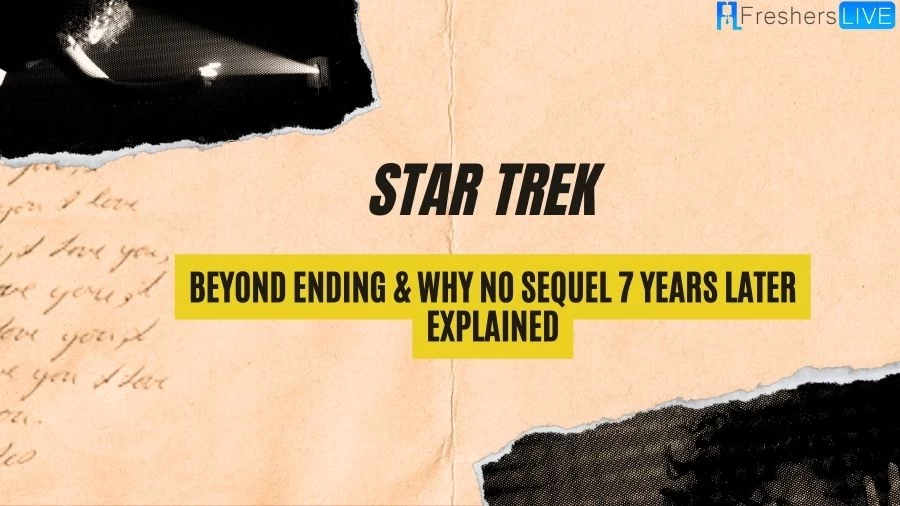‘Star Trek Beyond’ and the Explanation of Why There’s No Sequel 7 Years Later
Although Chris Pine’s Kelvin Timeline team hinted at the potential for more adventures in the Star Trek Beyond finale, Star Trek 4 has yet to materialize, seven years after the film’s release. In Star Trek Beyond, the third film produced by J.J. Abrams, the crew of the USS Enterprise is stranded on the planet Altamid. There, they discover an ancient Starfleet ship and discover that Krall and his troops are the mutant crew of the USS Franklin. Krall’s plans to avenge the Federation continued for decades, ever since the Federation’s crash on Altamid.
- 15 Iconic Wicked Quotes The Movie Must Include
- 10 Movies That Are Basically Ripoffs Of The Karate Kid
- Is Sophy Ridge Leaving Sky? What Happened to Sophy Ridge on Sunday? Why is Sophy Ridge Not on Sky? Where is Sophy Ridge Going?
- Nalla Nilavulla Rathri Movie Release Date and Time 2023, Countdown, Cast, Trailer, and More!
- Arthdal Chronicles The Sword Of Aramun Season 1 Episode 2 Release Date and Time, Countdown, When is it Coming Out?
While Kirk and Spock ponder their future during the events of Star Trek Beyond, the film doesn’t explicitly indicate that it marks the end of the Kelvin timeline. Captain Kirk has lost faith in his five-year mission and applies for the lieutenant general position at the revolutionary starbase Yorktown. Meanwhile, the death of Ambassador Spock (Leonard Nimoy) prompts his younger self to consider leaving Starfleet and continuing Spock’s diplomatic work on New Vulcan. However, as the events of the film unfold, both Kirk and Spock realize that their place is aboard the USS Enterprise, uniting to continue their five-year mission.
You are watching: Star Trek Beyond Ending & Why No Sequel 7 Years Later Explained
Why there’s no sequel to ‘Star Trek Beyond’ after seven years
There could be a number of reasons for the delay in delivery of the Star Trek Beyond sequel, but two factors stand out the most. First, there may be pay disputes and contract negotiations involving the cast and crew, especially given the success of the previous films and the popularity of some of the actors. Negotiations over compensation and other contractual matters can sometimes be complex and time-consuming, causing delays in project progress.
See more : Who are Adam Hills Parents? Meet Bob Hills
Secondly, the desire to compete with the ever-expanding Marvel blockbuster universe may have played a big role. The Marvel Cinematic Universe (MCU) dominates the box office, captivating audiences around the world with its interconnected stories and grand spectacle. As studios aim to carve out a niche in the competitive entertainment industry, they may choose to strategize and carefully plan the release of new Star Trek movies to maximize their success amid Marvel’s massive release Chance.
trend
Star Trek
Star Trek is an American science fiction media series created by Gene Roddenberry that began as an iconic television series in the 1960s and quickly became popular in global pop culture. It has since expanded into movies, TV series, video games, novels, and comics, becoming one of the most famous and highest-grossing franchises of all time. The journey begins with Star Trek:
The original series follows the adventures of the crew of the USS Enterprise as they explore new worlds and civilizations in the 23rd century. The success of the series has spawned spin-offs, movies, and the most recent reboot, The Kelvin Timeline. “Star Trek” has a loyal fan base known as “Trekkies” or “Trekkers”, and in the early days of American television, it had a major cultural impact in promoting civil rights and diversifying its cast.
The concept and background of Star Trek
In 1964, Gene Roddenberry came up with the idea for a science fiction series that would eventually become Star Trek. Although he publicly described it as a space western similar to “Wagon Train to the Stars,” he privately believed that it was inspired by Jonathan Swift’s “Gulliver’s Travels” and intended to be a suspenseful thriller. Adventure is intertwined with moral lessons. The show focuses on the humans and aliens of Starfleet, the humanitarian and peacekeeping force of the United Federation of Planets who embody altruistic values in the face of challenging dilemmas.
Star Trek narratives often serve as allegories for contemporary cultural issues. The original series tackled issues of the 1960s, while subsequent spin-offs tackled issues relevant to their respective eras. These topics include war, loyalty, authoritarianism, imperialism, class conflict, economics, racism, religion, human rights, sexism, feminism, and the impact of technology. Roddenberry used this futuristic setting to discuss provocative themes such as sex, politics, and Vietnam, often using alien themes as a guise to put such information through network censorship.
Disclaimer: The above information is for general information purposes only. All information on this website is provided in good faith, but we make no representations or warranties, express or implied, as to the accuracy, adequacy, validity, reliability, availability or completeness of any information on this website.
Source: https://truongnguyenbinhkhiem.edu.vn
Category: Entertainment
